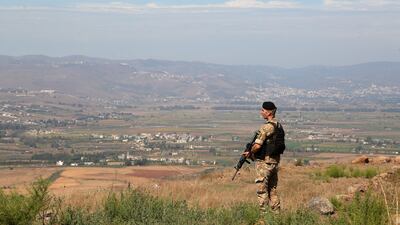A suspected Israeli strike near the border with Lebanon on Monday killed Syrian tycoon Mohammed Baraa Katerji, his company said.
Mr Katerji was one of the major players in Syria's lucrative war economy and an important figure in the country's business ties with Iran.
The “scion of the Katerji clan” was killed by an "Israeli raid" in the Sabboura area, Katerji Holding Group said. Isreal has not commented on the killing and there is no independent confirmation that it was carried out by Israel.
The activities of the conglomerate, which has close links with Iran, are focused on oil and gas, construction, manufacturing, transport, trading and finance.
Syrian pro-government media outlets published pictures purportedly showing Mr Katerji's car on fire on the Damascus-Beirut road.
Mr Katerji was part of a new class of businessmen loyal to President Bashar Al Assad that emerged during the civil war.
The new businessmen displaced a significant proportion of more established merchant families that had underpinned the regime's rule.
The newcomers often sponsor militias and some have even commanded them. They also developed links with outside powers, mainly Iran and Russia, which have been crucial to the survival of the system.
Mr Katerji, who was in his late 40s, was based in Aleppo, where he oversaw a militia.
A large part of his fortune came from oil, which became a scarce commodity in Syria after major fields were taken over by ISIS and then US-backed Kurdish militias during the civil war.
Supplies of crude oil from Iran have been crucial in dealing with shortages in regime-controlled areas.
In 2018, the US government imposed sanctions on Mr Katerji and his brother Hussam, a member of Syria's parliament.
The State Department said at the time that Mr Katerji “facilitated fuel trade between the Syrian regime and ISIS, including providing oil products to ISIS-controlled territory”.
The two brothers became “the exclusive agent for providing supplies to ISIS-controlled areas, including oil and other commodities”.
A lorry company under their control also “shipped weapons from Iraq to Syria”, the US State Department said.
Israel has increased its campaign of assassinating Iranian-linked figures in Syria and Lebanon since the war in Gaza broke out in October.
Last week, another Israeli drone strike killed Yasser Kranbish, a former bodyguard of Hezbollah leader Hassan Nasrallah, on the same road on which Mr Katerji died.
Sources in the Syrian opposition said Mr Kranbish was a central operative in the Lebanese group's operations aimed at securing advanced weaponry.


